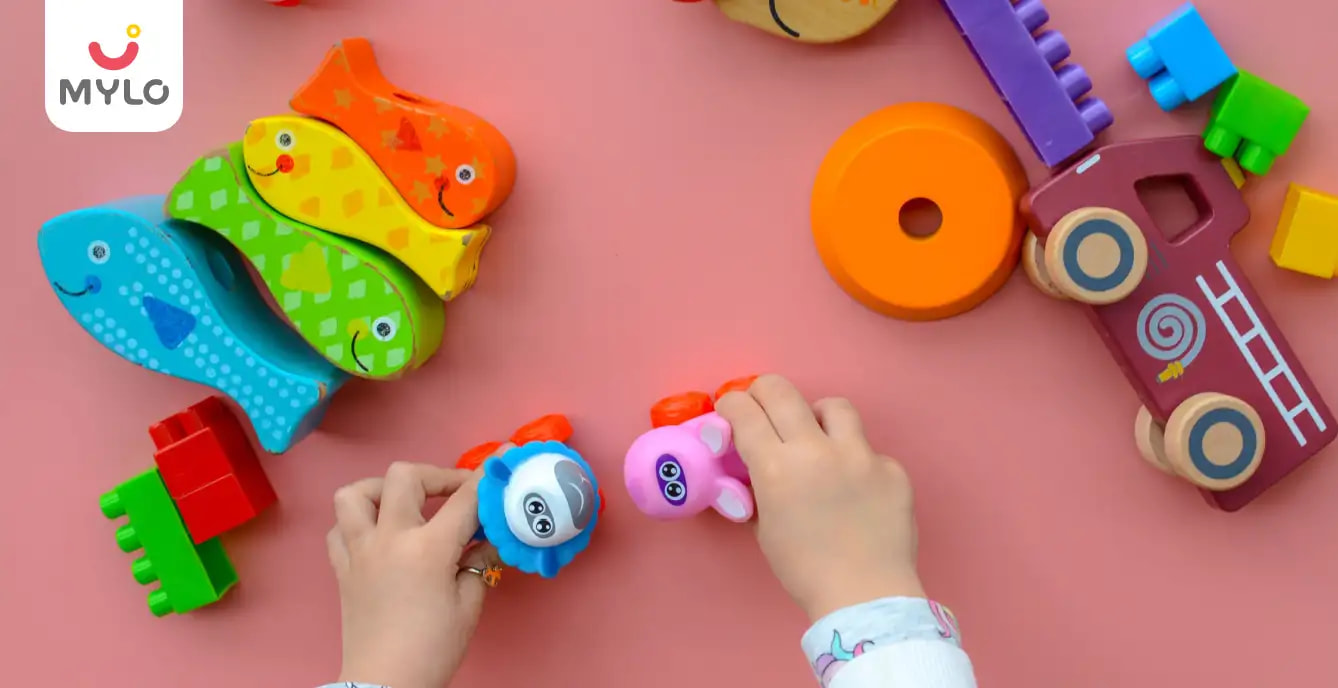Home

Developmental Disorders

Identifying Developmental Disorders in Toddlers
In this Article

Developmental Disorders
Identifying Developmental Disorders in Toddlers
Updated on 3 November 2023
All parents track their children’s development. In most cases, children reach their milestones on time. However, in some cases, a child may not do something they are “supposed to” by a particular age. Identifying and treating developmental disorders is extremely important to help such children lead normal lives.
'Developmental disorder' is a broad term encompassing a wide range of conditions. These can be physical disabilities, intellectual disabilities, cognitive impairments, hearing, and vision, as well as learning disorders. A developmental delay can further prevent a child from acquiring other appropriate skills. Therefore, it is essential for parents to recognise any possible delays and address them as quickly as possible.
What are the Symptoms of Developmental Disorders?
A number of different symptoms are associated with childhood developmental disorders. Some of these symptoms may be noticeable in infancy. Other symptoms may not be recognisable till the child starts going to school. A few common signs and symptoms of developmental disorders in toddlers include:
-
Developing and learning slower in comparison to other children of the same age
-
Rolling over, crawling, sitting, or walking much later in comparison to other children of the same age
-
Talking late or having difficulty talking
-
Difficulty socialising or communicating
-
Issues in remembering things
-
Difficulty with logical thinking or problem-solving
-
Abnormally low scores on IQ tests
-
Inability to understand actions and their consequences
-
Inability to do normal tasks such as using the restroom or getting dressed without help
-
Issues with learning or understanding in school
In case these symptoms are being caused due to underlying medical issues, timely identification and treatment can help improve the child’s development.
You may also like : Management of Developmental Disorders in Toddlers
What are the Causes of Developmental Disorders?
There is no particular known cause of developmental delay. However, certain factors may contribute to its occurrence before the birth of the child, during the birthing process, or even after birth. Possible causes include:
-
Hereditary or genetic conditions such as Down Syndrome
-
Trauma to the brain caused due to Shaken Baby Syndrome
-
Metabolic disorders such as phenylketonuria (PKU)
-
Exposure to toxic substances such as lead poisoning or prenatal alcohol exposure
-
Severe psychosocial trauma, like PTSD
-
Deprivation of proper environment or food
-
Certain serious infections
What are the Most Common Developmental Disorders in Children?
Developmental disorders can be classified into different types. The list of developmental disorders includes:
1. Communication Disorders
This is the most noticeable type of developmental disorder. It affects the child’s ability to communicate and understand simple instructions. Communication is essential for making sense of the world. Due to this, such children can also experience impairments and delays in other aspects of their lives. Communication disorders include expressive language disorder, stuttering, phonological disorder, and mixed receptive-expressive disorder.
2. Physical Developmental Disorders
Physical or motor disabilities include issues with walking and proper use of arms and hands. Some physical disabilities in children also affect their speech and swallowing. Common disorders include muscular dystrophies, spinal atrophies, and cerebral palsy.
3. Learning Disabilities
Children with learning disabilities experience problems in performing certain tasks if left alone or instructed using conventional methods of teaching. These include disorders such as dyslexia, dysgraphia, and dyscalculia.
4. Autism Spectrum Disorders
This is a type of neurodevelopmental disorder, in which the children exhibit difficulty interacting with other people. Verbal and non-verbal communication is difficult for them to understand and express. They often get noticeably restrictive or demonstrate repetitive behaviour.
5. Attention-Deficit/Hyperactivity Disorder
Popularly called ADHD, the condition affects the executive functions of a child like control over their inhibitions and attention.
How is a Developmental Disorder Diagnosed?
In some cases, developmental disorders may be detected early, even during pregnancy. However, in many cases, they become evident after the child reaches school age. Assessment and diagnosis of the different disorders in the list of early childhood disabilities involve various professionals such as:
-
Paediatricians
-
Neuropsychologists
-
Child psychiatrists or psychologists
-
Speech pathologists
All these professionals work in tandem with each other to diagnose the condition(s).
Also Read: Childhood Disorders: Meaning, Symptoms & Treatment
How to Help a Child with Developmental Disorder?
Treatment for developmental disorders involves a combination of medication, therapy, skills training, and other supports as well. It is very important to work in close collaboration with healthcare professionals to find the right combination that works best for your child.
1. Medication
The doctor may prescribe medication for managing symptoms such as anxiety, insomnia, low mood, anger, irritability, attention difficulties, and aggressive behaviour. Besides this, regular assessments and checkups are required to manage the condition efficiently.
2. Therapy
It is one of the most important parts of treatment for children with developmental disorders. Depending on the condition and the issues in child development psychology, healthcare professionals may recommend therapies such as Cognitive Behavioral Therapy, Creative Arts Therapy, Family Therapy, Applied Behavior Analysis, skills training, Client-centered Therapy, mindfulness practices, etc.
3. Parent Skills Training
Parents are recommended to undergo training to understand their children’s needs better. The training can help them understand how they can support their children in the best possible manner. Some examples include ADHD support and training for parents, Incredible Years Training Program for parents, etc.



Written by
Loveleen Gupta
A working mother with more than two decades of experience in writing for the publishing industry and digital space, Loveleen Gupta loves dabbling in creative writing also. A graduate from Miranda House, she uses her personal experiences to express herself.
Read MoreGet baby's diet chart, and growth tips

Related Articles
Why Protein Is Essential During Pregnancy: Benefits of Protein-Rich Snacks
Top 100 Baby Names for Boys and Girls 2026 Edition: The Ultimate Trending & Meaningful Name Guide
The Ultimate Guide to the Best Romantic Web Series on OTT for Couples
Best Indian Crime Web Series Based on True Stories: The Ultimate Binge-Watch Guide (2026)
Related Questions
Influenza and boostrix injection kisiko laga hai kya 8 month pregnancy me and q lagta hai ye plz reply me

Hai.... My last period was in feb 24. I tested in 40 th day morning 3:30 .. That is faint line .. I conculed mylo thz app also.... And I asked tha dr wait for 3 to 5 days ... Im also waiting ... Then I test today 4:15 test is sooooo faint ... And I feel in ma body no pregnancy symptoms. What can I do .

Baby kicks KB Marta hai Plz tell mi

PCOD kya hota hai

How to detect pcos

Related Topics
RECENTLY PUBLISHED ARTICLES
our most recent articles

Diet & Nutrition
গর্ভাবস্থায় আলুবোখরা: উপকারিতা ও ঝুঁকি | Prunes During Pregnancy: Benefits & Risks in Bengali

Diet & Nutrition
গর্ভাবস্থায় হিং | ঝুঁকি, সুবিধা এবং অন্যান্য চিকিৎসা | Hing During Pregnancy | Risks, Benefits & Other Treatments in Bengali

Women Specific Issues
স্তনের উপর সাদা দাগ: লক্ষণ, কারণ এবং চিকিৎসা | White Spots on Nipple: Causes, Symptoms, and Treatments in Bengali

Diet & Nutrition
গর্ভাবস্থায় পোহা: উপকারিতা, ধরণ এবং রেসিপি | Poha During Pregnancy: Benefits, Types & Recipes in Bengali

Diet & Nutrition
গর্ভাবস্থায় মাছ: উপকারিতা এবং ঝুঁকি | Fish In Pregnancy: Benefits and Risks in Bengali

Diet & Nutrition
গর্ভাবস্থায় রেড ওয়াইন: পার্শ্ব প্রতিক্রিয়া এবং নির্দেশিকা | Red Wine During Pregnancy: Side Effects & Guidelines in Bengali
- ইনার থাই চ্যাফিং: কারণ, উপসর্গ এবং চিকিৎসা | Inner Thigh Chafing: Causes, Symptoms & Treatment in Bengali
- গর্ভাবস্থায় ব্রাউন রাইস: উপকারিতা ও সতর্কতা | Brown Rice During Pregnancy: Benefits & Precautions in Bengali
- Velamentous Cord Insertion - Precautions, Results & Safety
- Unlock the Secret to Flawless Skin: 7 Must-Have Qualities in a Face Serum
- Unlock the Secret to Radiant Skin: How Vitamin C Serum Can Transform Your Complexion
- Gender No Bar: 10 Reasons Why Everyone Needs a Body Lotion
- Unlock the Secret to Radiant Skin How to Choose the Perfect Body Lotion for Your Skin Type
- Top 10 Reasons to Apply a Body Lotion After Every Bath
- Communication in Toddlers: Milestones & Activities
- How to Improve Vocabulary for Toddlers?
- A Comprehensive Guide to Understanding Placenta Accreta
- Vulvovaginitis in Toddlers Causes, Symptoms and Treatment
- A Comprehensive Guide to Understanding Cerebral Palsy in Children
- Bitter Taste in Mouth During Pregnancy: Understanding the Causes and Remedies


AWARDS AND RECOGNITION

Mylo wins Forbes D2C Disruptor award

Mylo wins The Economic Times Promising Brands 2022
AS SEEN IN

- Mylo Care: Effective and science-backed personal care and wellness solutions for a joyful you.
- Mylo Baby: Science-backed, gentle and effective personal care & hygiene range for your little one.
- Mylo Community: Trusted and empathetic community of 10mn+ parents and experts.
Product Categories
baby carrier | baby soap | baby wipes | stretch marks cream | baby cream | baby shampoo | baby massage oil | baby hair oil | stretch marks oil | baby body wash | baby powder | baby lotion | diaper rash cream | newborn diapers | teether | baby kajal | baby diapers | cloth diapers |




